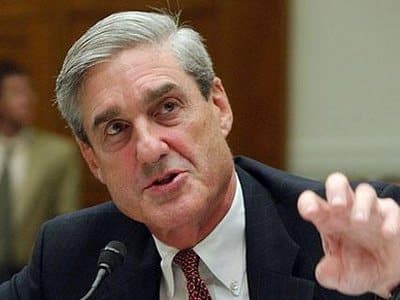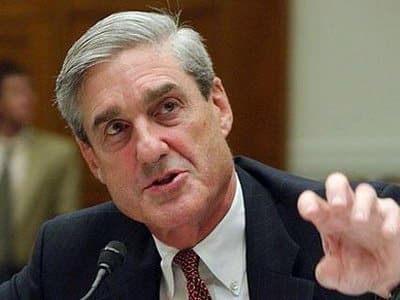
It’s still not clear to me the particular crime for which special prosecutor Robert Mueller is investigating President Trump.
Was it illegal for Vladimir Putin to support Trump for president instead of Hillary Clinton?
Nope.
Was it illegal for Trump to receive advice, support, and consultation from Vladimir Putin or any other Russian politico on how best to defeat Clinton?
Nope.
In fact, imagine if George W. Bush and his English poodle Tony Blair had “colluded” to defeat Bush’s presidential opponent, Al Gore. Would the Pentagon, the CIA, and their assets in the mainstream press be making the same brouhaha that they’re making today about Trump’s supposed “collusion” with Russia to defeat Clinton? We all know they wouldn’t have. It’s the anti-Russia obsession that the Pentagon and the CIA instilled in the American people throughout the Cold War that is driving the current anti-Russia brouhaha.
Ordinarily, a special prosecutor would have evidence that a certain crime has been committed and would be investigating whether there is sufficient evidence to warrant an indictment for that crime.
That’s not what Mueller is doing. It’s clear that he is on a giant wide-ranging fishing expedition in which he and his cohorts are examining evidence in which they hope to find a crime — any crime — on which to get Trump.
And that’s where Trump is likely to be in danger, especially given that he is a businessman and a builder.
One of the biggest benefits of the regulated economy is that it provides federal officials with the ability to prosecute businessmen, builders, and bankers for economic crimes. That’s because there is no way that businessmen, builders, and bankers can ever comply with all the federal regulations and tax provisions that govern their industries. Inevitably, they are going to run afoul of one or more of them. That’s what enables the feds to pounce and exclaim, “See! He’s a bad person! He violated an economic regulation or tax provision. He needs to be punished!”
One of the best descriptions for the benefit of a state-regulated economy was set forth by Ayn Rand in her novel Atlas Shrugged in a statement made by the slimy state bureaucrat Dr. Floyd Ferris:
Did you really think that we want those laws to be observed?” said Dr. Ferris. “Wewant them broken. You’d better get it straight that it’s not a bunch of boy scouts you’re up against — then you’ll know that this is not the age for beautiful gestures. We’re after power and we mean it. You fellows were pikers, but we know the real trick, and you’d better get wise to it. There’s no way to rule innocent men. The only power any government has is the power to crack down on criminals. Well, when there aren’t enough criminals, one makes them.
Every businessman, builder, and banker, both here and in Russia, knows the danger of the regulatory and tax power that hangs over his head like the Sword of Damocles. That’s undoubtedly why there are no major CEOs in the country publicly speaking out against US foreign policy. They know what will happen to them in terms of regulatory and tax enforcement.
Look what they did to former Qwest CEO Joseph Nacchio. After the 9/11 attacks, US officials approached Nacchio and asked him to sell his customers down the river by illegally giving their personal information to the feds. The feds told Nacchio that he would be a “patriot” by doing this.
To his everlasting credit, Nacchio said no. But he ended up paying a big price. The feds went after him on some stupid insider-trading violation and he ended up getting convicted and spending time in jail.
Businessmen, bankers, and builders are most at risk given the extensiveness and complexity of the regulations and tax provisions under which they operate.
Businessmen and builders who operate internationally are at even bigger risk. They quickly learn that one of the reasons for the regulated economy in foreign countries is to provide bribe income to government officials. Want to avoid a regulation? Just pay the bribe.
From the standpoint of a businessman, paying the bribe makes perfect sense. But many years ago, US officials made it a federal offense to do so, thereby providing the feds with one more thing with which to go after American businessmen who operate internationally.
Trump has built hotels and resorts all over the world. Has he or any of his subordinates paid bribes to foreign officials to avoid regulatory obstructions to Trump’s building projects? There certainly is no evidence to indicate that they have. But even if Trump hasn’t personally done so, it’s entirely possible that some subordinate has done so secretly — a subordinate who might readily be willing to perjure himself and incriminate Trump to get off the hook as part of the types of sweetheart deals that the feds often offer people to catch bigger fish.
Will Mueller limit his investigation into whether Trump “colluded” with the Russians to win the election? Maybe. But I don’t think so because political “collusion” with foreigners to win an election isn’t a crime. I think there is a good possibility that Mueller is going to go after Trump in the same way that the feds went after Nacchio — by trying to find some stupid regulatory or tax provision that Trump or his subordinates might have violated.
Reprinted with permission from the Future of Freedom Foundation.


